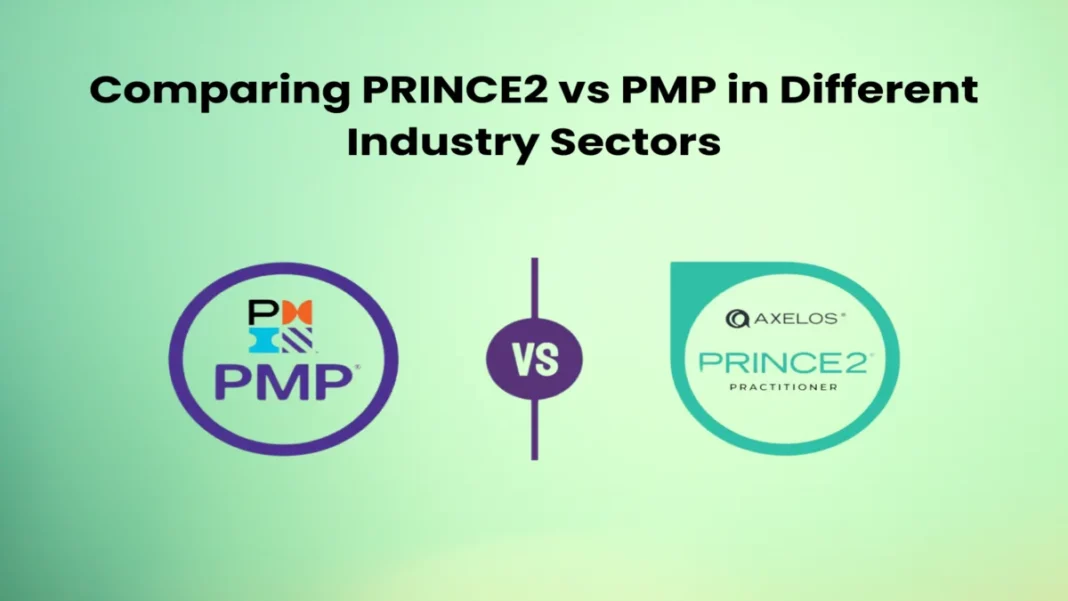Project Management professionals often get confused about choosing between PRINCE2 and PMP Certification Course. Both these certifications are accepted at large, but on the industrial basis, both these could offer unique advantages. This blog looks at PRINCE2 vs PMP, their compliance to different industry standards, and what these frameworks means to a Project Manager.
An Overview of PRINCE2 and PMP
PRINCE2 (Projects in Controlled Environments) is a process-based technique used in Australia, Europe, and the United Kingdom. It is a structured methodology that splits a project into controllable and manageable stages. In addition, PRINCE2’s flexibility makes it usable in almost any type of project.
The Project Management Institute’s (PMI) PMP (Project Management Professional) certification is acceptable in the United States, Canada, and other countries of the world. It is knowledge-based project management and touches on a wide area of topics, which empowers a professional to take up effective leadership in projects.
PRINCE2 vs PMP in Construction and Engineering
The decision between PRINCE2 or PMP can be critical to the project outcome for engineering and construction industries, which largely house huge and complex projects. Sectors such as these can reap the maximum benefits of the structured guidance of PRINCE2, ensuring that each project phase is correctly initiated and controlled in a logical sequence. This method works exceptionally well for handling complex issues in building projects.
On the other hand, PMP is beneficial since it prioritises quality, time, and money management—three important issues in engineering projects. The ability to apply complete project management principles beyond the immediate area of engineering activities makes PMP-certified personnel highly sought after.
PRINCE2 vs PMP in Information Technology
The IT industry is well known for moving quickly and requiring project managers to be flexible. This is where the discussion between PMP and PRINCE2 takes an intriguing turn. Because of its flexibility, PRINCE2 is a good option for IT projects that must be updated and adjusted frequently. Because of its stage-based approach, it facilitates continuous improvement and iterative development, which are crucial for IT infrastructure and software development projects.
On the other hand, PMP maintains its position due to its broader emphasis on combining project management with IT operations. The PMP certification programme gives professionals the tools they need to effectively manage stakeholders, resources, and project risks so that IT projects can achieve larger business objectives.
PRINCE2 vs PMP in Healthcare
Strict rules, extensive risk management, and a need for strong stakeholder participation are standard in healthcare initiatives. Because PRINCE2 places a great emphasis on structure and governance, it is especially beneficial in this industry. It assists in guaranteeing that healthcare initiatives meet legal requirements and produce the intended results without sacrificing patient safety or care.
Healthcare projects benefit from the unique set of skills that PMP professionals offer. Their risk management and decision-making proficiency are essential when handling the industry’s intricacies and uncertainties. They are skilled at balancing the crucial human components and the technical aspects of healthcare projects, guaranteeing the project’s overall success.
PRINCE2 vs PMP in Finance and Banking
PRINCE2 and PMP methods can be most helpful in banking and financial sectors, where accuracy, proper risk management, and following all the necessary compliance procedures are a part of everyday life. PRINCE2’s structured method will be beneficial for projects requiring a lot of documentation and standards adherence, such as large-scale implementations of systems or compliance projects.
PMP is very helpful for finance projects with complicated stakeholder management and large financial stakes because of its emphasis on quantitative approaches and strategic alignment. Because of their extensive experience in project management, PMP-certified managers are frequently at the forefront of initiatives to incorporate new technologies or enhance financial systems.
PRINCE2 vs PMP in Retail and Consumer Goods
Project management is essential for success in the retail and consumer products sector due to the quick changes in customer behaviour and the requirement for efficient project execution. This industry benefits greatly from PRINCE2 since it offers a well-defined project structure and makes it easier for teams with different backgrounds to communicate effectively. Thanks to this organised approach, projects like new product launches, store openings, or digital transformation initiatives will be carried out successfully and efficiently.
Meanwhile, the PMP certification’s emphasis on risk management and problem-solving makes it useful in this industry. PMP-certified experts are adept at handling the challenges of marketing initiatives, customer service enhancements, and supply chain disruptions. Their capacity to combine project management with more comprehensive business plans is essential for accelerating expansion and adapting to changes in the market.
Conclusion
The specific needs of the industry sector and the type of projects involved play a major role in the decision between PRINCE2 and PMP. These certificates provide thorough frameworks and competencies that improve project management’s efficacy and success. By understanding the advantages and uses of each, professionals can make intelligent decisions that align with their career objectives and their companies’ strategic requirements.
Professionals looking to progress in their professions should think about the industry they are enthusiastic about and select a certification program—such as PRINCE2 or PMP—that fits both their objectives and the requirements of the industry they have chosen. In addition to broadening their area of competence, this calculated move will create new opportunities for success and career advancement in project management. For more information visit:The Knowledge Academy.


